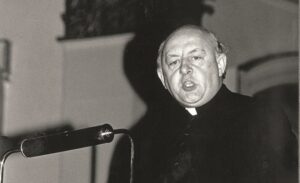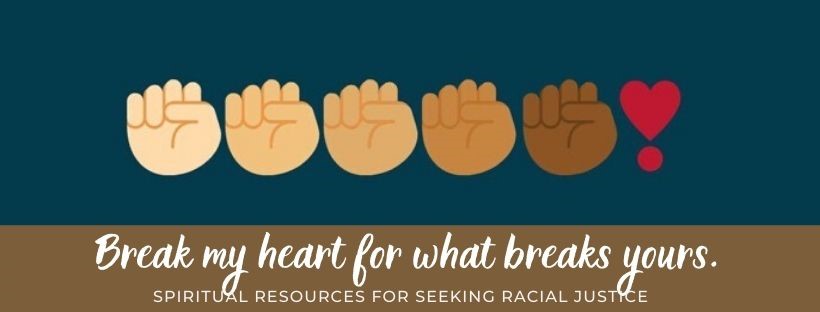The Episcopal Urban Caucus 1994
In 1994 The Episcopal Urban Caucus (EUC) met in Charlotte, North Carolina. Founded in 1975 the EUC is a group within Episcopal Church in the United States that seeks to raise up issues of social justice for the wider church. Their mission statement in part affirms, “In response to God’s creative, redeeming and sanctifying love for us, we commit ourselves to the mission of the Church with the poor.” (1) Toward that end they hold regular conferences to encourage and equip people for their mission. The emphasis for the gathering in 1994 was “Toward a Spirituality of Anti-Racist Ministry.”
The keynote address for the event was delivered by Rev. Kenneth Leech, a British Anglican priest who had spent his entire ministry in the East End of London, a neighborhood that historically has been characterized by poverty, immigrant communities and desperate socio-economic need. Outside of London, Leech is best known for his books on prayer and dimensions of the spiritual life. However, at the same time he was a tireless advocate for racial justice for the often despised and forgotten citizens of his community (2).
Rev. Kenneth Leech
Leech began his address by telling the story of Maktar Ahmed, a 19-year-old Muslim man who was beaten unconscious by 25 white youths. He went on to say, “The East End of London [has] been a focal point for racist, anti-Semitic and fascist organizing since the beginning of the 20th century.” He confessed his personal struggle with how to carry on a ministry in such a hateful and violent environment while ‘building up the spiritual resources necessary for the pursuit of justice and for resistance to the demons of racism” (3).
The purpose of his address was to explore the characteristics of an antiracist spirituality (4) in such a time and place as he found himself. While nearly 30 years have passed since Leech spoke to the Episcopalian leaders gathered in Charlotte that day, I find his words prescient and relevant to people of faith concerned about racial justice today. We live in a time when the hard gains from the Civil Rights Movement are being systematically rolled back or outright eradicated by the Supreme Court and state legislatures. Emboldened by political leaders like Ron Johnson and Ron DeSantis, educators find themselves under fire for teaching the full history of the nation with their students, because of laws significantly limiting what can be taught about African American, and Native American history. Moreover, books by authors of color like Pulitzer Prize winner Toni Morrison are being pulled off school library shelves. Voting laws are being passed making it more difficult for people to register to vote and even get to a voting station accessible to them. Additionally, violence against persons of color and their institutions such as houses of faith, shopping malls, and music venues.
Three Characteristics of an Antiracist Spirituality

Rev Kenneth Leech
In his address Rev. Leech highlighted three characteristics of an antiracist spirituality. First, he said that an anti-racist spirituality should be both radical and traditional. A “radical” spirituality is rooted in the deep truths of the Gospel and a “traditional” spirituality draws on the foundations of one’s theological tradition. A passion for justice is not some liberal aberration from the Judeo-Christian and biblical tradition, but rather the essence of God’s desire for the world. That is what Leech means by radical and traditional.
Second, Leech said an antiracist spirituality must be both material and transcendent. By that he meant we must deal concretely with the material needs that people who are marginalized and oppressed must contend with the need for affordable housing, healthy food, a living wage, quality education, accessible health care, and the like. He points out that BIPOC people have these needs because racism is embedded in the structures designed to provide for those needs, thus creating gross inequities BIPOC people often face in seemingly “prosperous” nations like Great Britain and the United States. At the same time our spirituality must be transcendent, affirming that all people, regardless of their race, ethnicity or skin color, are created in the image and likeness of God, and deserve to be treated as full human beings. Racism in its very nature is a blatant refusal to acknowledge others’ God-given humanity and must be resisted and overcome at every turn. An antiracist spirituality must be committed to making the struggle for racial equity and justice a core component of one’s spiritual life in both contemplative and activist endeavors.
Finally, Leech said that an antiracist spirituality “must be prepared to live with darkness and perplexity.” To resist racism in its many expressions is to contend with evil in its most pernicious forms. Racial disparity in our day does not exist because white people don’t understand what is at stake or because BIPOC people are lazy and unmotivated. Rather, those in the dominant culture know disparities exist and choose the ways of division and exploitation and then blame the targets of their efforts for falling short. Leech says our spirituality must “be rooted in a vision of a better order, a vision of God’s kingdom,” God’s reign over our individual and corporate lives. And in that order there must be opportunity, access to resources and the affirmation that all people are created equal and therefore deserve to be treated equally under the law.
The Implications of an Anti-racist Spirituality
According to Leech, an antiracist spirituality must take seriously the anger and pain expressed by the racially marginalized in our society. It requires that each person, regardless of race or background, examine themselves for the racist impulses and ideas they may have inherited from their elders. It means we must be open to engage in the struggle and conflict necessary to advocate and work for justice. An antiracist spirituality compels us to be willing to work alongside and even under the leadership of those closest to the pain caused by interpersonal and systemic racism. And it means that with both our minds and our bodies we must work for the changes that must come so our society can be free and just for all.
There are some religious leaders, particularly within evangelical Christian circles, who contend that working for social and racial justice undermines and is even antithetical to God’s work in the world. Yet one cannot read the Torah, the Hebrew prophets, the apostle Paul and the works and words of Jesus as anything but a call to radical love and justice for all human beings made in “the image and likeness of God” (Genesis 1.26-28). To that end, faithfulness requires that both individually and corporately we live into that call to love and justice with our hearts, minds, spirits and bodies.
NOTES
- The entire mission statement can be found at https://www.episcopalurbancaucus.org/about-us/
- Leech served as minister in East London from 1958 till his death in 2015.
- This quotation and all the others that follow come from a book developed after the EUC Conference called To Heal The Sin-Sick Soul: Toward a Spirituality of Anti-Racist Ministry, edited by Emmett Jarrett.
- Today generally speaking the word “antiracist” is not hyphenated, but I have maintained Leech’s use and spelling of the word when quoting hm but elsewhere I have used the more contemporary rendering of the word .


Great perspective Drick – Ben Brooks majorben@verizon.net
Agree with the thoughts here. Thanks Dr. Boyd